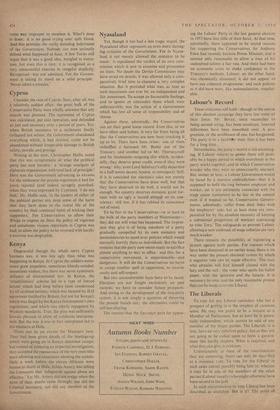Nyasaland
Yet, though it has had a less tragic sequel, the Nyasaland affair represents an even more damag- ing criticism of the Government. For in Nyasa- land it not merely allowed the mistakes to be made: it repudiated the verdict of its own com- mission which it sent to examine and pronounce on them. No doubt the Devlin Commission may have erred on details; it was allowed only a com- paratively brief time to examine a very complex situation. But it provided what was, as near as such documents can ever be, an independent and fair assessment. To accept its favourable findings, and to ignore or contradict those which were unfavourable, was the action of a Government which has lost all sense of responsibility and of shame.
Against these, admittedly, the Conservatives can set their good home record. Even this, as we have often said before, is very far from being all that the Conservatives are now busy cracking it up to be. There have been crises : one of them reshuffled a harassed Mr. Butler out of the Treasury, and another led to Mr. Thorneycroft and his lieutenants resigning (for which, inciden- tally, they deserve great credit, even if they were wrong : why, even Lord Salisbury's silly departure in a huff seems decent, honest, in retrospect). Still, if it is conceded for election's sake not merely that the Conservatives have done well, but that they have deserved to do well, it would not be enough. No country deserves domestic good for- tune with so ugly a record abroad on its con- science: still less, if it has rubbed its conscience out of mind.
To be fair to the Conservatives—or at least to the bulk of the party members at Westminster— they did not will what has happened. The impres- sion they give is of being members of a party gradually compelled by its own mistakes and inconsistencies to stand over policies which would normally horrify them as individuals. But the fact remains that.the party now seems ready to saCrifice almost anything to stay in office : and this, for a conservative movement, is unpardonable—and dangerous. It will do the Conservatives no harm to accept another spell in opposition, to recover sanity and self-respect.
But two uncomfortable facts have to be faced. Elections are not fought exclusively on past records; we have to consider future prospects. And owing to the development of the two-party system, it is not simply a question of throwing the present bunch out: the alternative could be still less alluring.
The reasons that the Spectator gave for oppos-, ing the Labour Party at the last general election in 1955 have lost little of their force. At that time, admittedly, there appeared to be sound reasons for • supporting the Conservatives. Sir Anthony Eden had recently become Prime Minister, and it seemed only reasonable to allow a man of his undoubted talents a fair run. And there had been no economic crisis to shake confidence in the Treasury's methods. Labour, on the other hand. was chronically disunited; it did not appear to have any coherent programme; and such policies as it did have were, like nationalisation. unpalat- able.






































 Previous page
Previous page